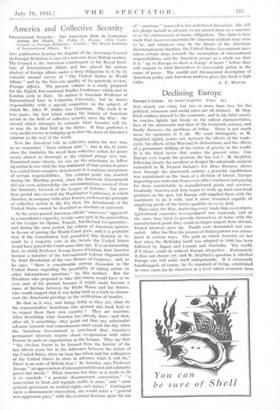America and Collective Security
ANY publication bearing the imprint of,the American Council on Foreign Relations is sure of a welcome from British readers. The Council is the American counterpart of the Royal Insti- tute of International Affairs and has placed the serious student of foreign affairs under a deep obligation to it by its valuable annual survey of "The United States in World Affairs" and by the first-rate quality of its quarterly review, Foreign Affairs. The present volume is a study prepared
for the Eighth International Studies Conference which met in London early in June. Its author is Associate Professor of
International Law in Columbia University, but he shares responsibility with n special committee on the subject, of which Mr. Allen W. Dulles was Chairman. The book is in two parts; the first which relates the history of American action M the field of collective security since the War' the•
second which attempts to estimate what America will do, or may do, in that field in the future. It thus performs a very useful service in bringing up to date the story of America's relation to the rest of the world.
Now the American role in collective action for war was, as we remember, "force without stint" ; but in the 17 years since the Armistice the recoil from collective action for peace
seems almost as thorough as the original plunge into war.
Examined more closely, we can see the reluctance to follow up action in war with the true fulfilment of that action in peace
has varied from complete detachment to a cautious acceptance of certain responsibilities. The extreme point was reached during the Harding period, when the American Government
did not even acknowledge the communications received from the Secretary General of the League of Nations ; but since that period also covered the Washington Conference, in which America, in company with other Powers, endorsed the principle of collective action in the Far East, the detachment of the United States cannot be described as absolute or universal.
As the years passed American official "observers" appeared,
in a consultative capacity, to take some part in the proceedings of the League on Opium, Transit, Intellectual Co-operation ;
and during the same period, the volume of American opinion in favour of joining the World Court grew, and it is probable that if the Constitution had permitted this decision to be made by a majority vote in the Senate the United States would have joined the Court some time ago. It is an interesting fact, to which Professor Jessup draws attention, that America became a member of the International Labour Organization by Joint Resolution of the two Houses of Congress ; and, as he says, "there is considerable current discussion in the United States regarding the possibility of taking action on
other international questions" by this method. But the President who proposed to take this course would have to be
very sure of his ground, because it might easily become a cause of friction between the White House and the Senate, who would suspect that it was being used as a trick to circum- vent the Senatorial privilege in the ratification of treaties.
Be that as it may, and things being as they are, what do the representative Americans who sponsor this book lead us to expect from their own country ? They are cautious. After describing what America has already done—and that,
after all, is something—they point out that any substantial advance towards real commitments must await the day when the American Government is convinced that America's permanent interests require closer co-operation with other Powers in such an organization is the League. They say that "the obvious lesson to be learned from the history of the last fifteen years lies in the difference between the action of the United States when an issue has arisen and the willingness of the United States to state in advance what it will do." There is an echo of Britain here! In America, says Professor Jessup," an appreciation of international interest and solidarity grows but slowly." What America has done or is ready to do is to conclude "a genuine disarmament convention," "a convention to limit and regulate traffic in arms," and "some general agreement on neutral rights and duties." Contingent upon a disarmament Convention, she would enter a "general
• non-aggression pact," with the eventual decision upon the use of" sanctions " reserved to her unfettered discretion. She will not pledge herself in advance to use armed force as a sanction or as the enforcement of treaty obligations. The claim is here made that, however uncertain the American attitude may seem to be, and whatever may be the future of the American disentanglement doctrine, the United States Government have taken certain steps towards the assumption of international responsibilities, and the American peopie as a whole say that it is "up to Europe to show a change of heart" before they will consent to bind themselves to irrevocable action in the cause of peace. The candid and documented description of American policy and American motives gives this book a high


























































 Previous page
Previous page